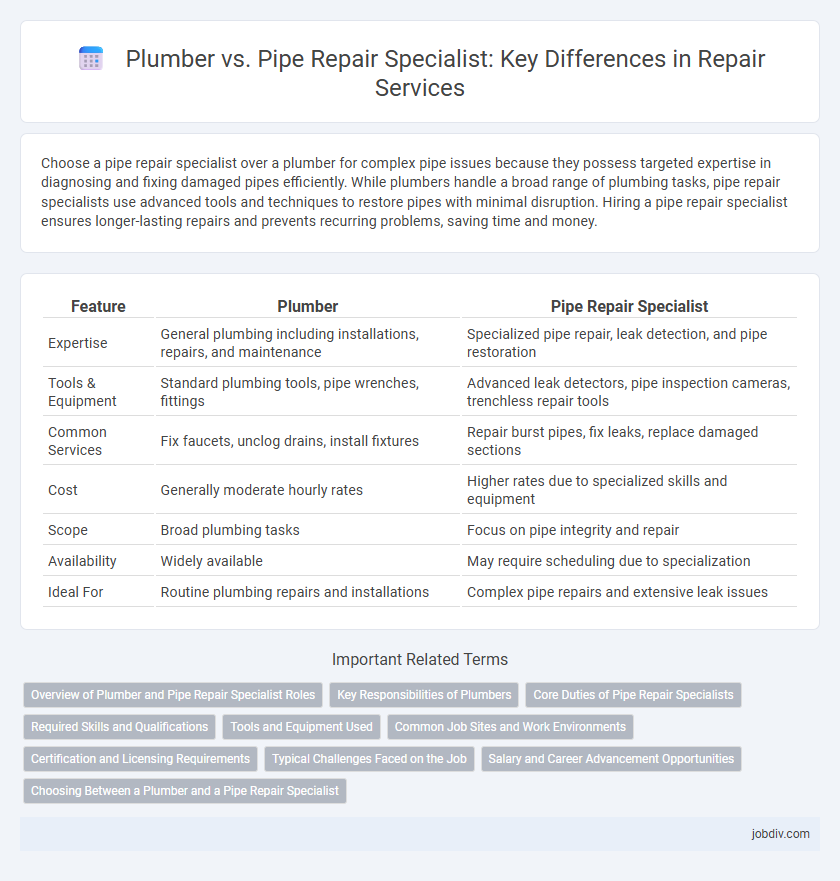Choose a pipe repair specialist over a plumber for complex pipe issues because they possess targeted expertise in diagnosing and fixing damaged pipes efficiently. While plumbers handle a broad range of plumbing tasks, pipe repair specialists use advanced tools and techniques to restore pipes with minimal disruption. Hiring a pipe repair specialist ensures longer-lasting repairs and prevents recurring problems, saving time and money.
Table of Comparison
| Feature | Plumber | Pipe Repair Specialist |
|---|---|---|
| Expertise | General plumbing including installations, repairs, and maintenance | Specialized pipe repair, leak detection, and pipe restoration |
| Tools & Equipment | Standard plumbing tools, pipe wrenches, fittings | Advanced leak detectors, pipe inspection cameras, trenchless repair tools |
| Common Services | Fix faucets, unclog drains, install fixtures | Repair burst pipes, fix leaks, replace damaged sections |
| Cost | Generally moderate hourly rates | Higher rates due to specialized skills and equipment |
| Scope | Broad plumbing tasks | Focus on pipe integrity and repair |
| Availability | Widely available | May require scheduling due to specialization |
| Ideal For | Routine plumbing repairs and installations | Complex pipe repairs and extensive leak issues |
Overview of Plumber and Pipe Repair Specialist Roles
Plumbers specialize in installing, maintaining, and repairing water supply systems, drainage, and fixtures in residential, commercial, and industrial buildings. Pipe repair specialists focus specifically on diagnosing, fixing, and replacing damaged or leaking pipes, often using advanced tools like pipe cameras and trenchless repair technology. Both roles require expertise in piping materials, but pipe repair specialists concentrate more on problem-solving and restoring pipe integrity within existing infrastructure.
Key Responsibilities of Plumbers
Plumbers specialize in installing, maintaining, and repairing water supply lines, drainage systems, and fixtures such as sinks, toilets, and water heaters. They also troubleshoot issues related to leaks, blockages, and pipe corrosion, ensuring systems comply with building codes and safety standards. Their expertise extends to assembling and inspecting piping systems in residential, commercial, and industrial settings to guarantee efficient water flow and sanitation.
Core Duties of Pipe Repair Specialists
Pipe repair specialists focus on diagnosing and fixing leaks, blockages, and structural damages within residential and commercial piping systems. They utilize advanced tools such as pipe cameras and hydro jetting equipment to ensure thorough inspection and effective repairs. Their expertise includes pipe replacement, joint sealing, corrosion treatment, and maintaining water flow integrity to prevent future issues.
Required Skills and Qualifications
Plumbers require comprehensive knowledge of water supply systems, drainage, and sewage systems, as well as proficiency in installing and maintaining pipes and fixtures. Pipe repair specialists focus on advanced skills in diagnosing leaks, corrosion, and pipe integrity issues, often using specialized equipment such as video inspection cameras and pipe locators. Both professionals typically need formal training and certification, but pipe repair specialists often hold additional qualifications in materials science or pipeline technology.
Tools and Equipment Used
Plumbers use a wide range of tools such as pipe wrenches, plungers, augers, and pipe cutters to install and repair various plumbing systems, including fixtures, drains, and water lines. Pipe repair specialists focus on advanced diagnostic and repair equipment like video pipe inspection cameras, pipe bursting tools, and trenchless pipe repair technology to address specific pipe damage and corrosion issues efficiently. Both professionals require specialized equipment, but pipe repair specialists employ more high-tech tools tailored for precise pipe condition assessments and minimally invasive repairs.
Common Job Sites and Work Environments
Plumbers and pipe repair specialists frequently work in residential homes, commercial buildings, and industrial facilities, addressing diverse piping systems and water supply needs. Plumbers often handle installations and maintenance in kitchens, bathrooms, and utility rooms, while pipe repair specialists focus on underground pipelines, sewage systems, and large-scale infrastructure projects. Both professionals must navigate confined spaces, hazardous environments, and require safety protocols tailored to their specific job sites.
Certification and Licensing Requirements
Plumbers typically hold state-issued licenses that require rigorous training and passing comprehensive exams to ensure expertise in installing and maintaining plumbing systems. Pipe repair specialists may also require certification, especially in specific areas such as sewer line repair or industrial pipe systems, depending on regional regulations. Both professionals must adhere to strict local and national codes to guarantee safety and compliance in their repair work.
Typical Challenges Faced on the Job
Plumbers frequently encounter challenges such as diagnosing hidden leaks, dealing with outdated or corroded piping, and managing water pressure issues that affect entire systems. Pipe repair specialists focus more intensely on technical complications like pipe bursts, joint failures, and trenchless pipe repair techniques, often requiring advanced tools for pipe lining or replacement. Both professionals must navigate access difficulties, material compatibility, and compliance with local plumbing codes to ensure durable and safe repairs.
Salary and Career Advancement Opportunities
Plumbers typically earn a median annual salary of around $56,000, while pipe repair specialists can command higher wages, often exceeding $65,000 due to their specialized skills in maintaining complex pipe systems. Career advancement for plumbers may lead to supervisory roles or business ownership, whereas pipe repair specialists have opportunities for advancement into technical management or consulting positions within industrial sectors. Both careers offer growth potential, but pipe repair specialists often benefit from higher earning ceilings and specialized career paths in infrastructure and utility companies.
Choosing Between a Plumber and a Pipe Repair Specialist
Selecting between a plumber and a pipe repair specialist depends on the complexity and scope of the issue, with plumbers handling general plumbing tasks including installations and maintenance, while pipe repair specialists focus on diagnosing and fixing specific pipe damage using advanced techniques. Pipe repair specialists excel in addressing corrosion, leaks, and pipe bursts with specialized tools like pipe locators and video inspection cameras, often resulting in more precise and durable repairs. Homeowners should consider the severity of the problem and seek a pipe repair specialist for targeted pipe restoration, whereas plumbers are suitable for broader plumbing system needs.
Plumber vs Pipe Repair Specialist Infographic

 jobdiv.com
jobdiv.com